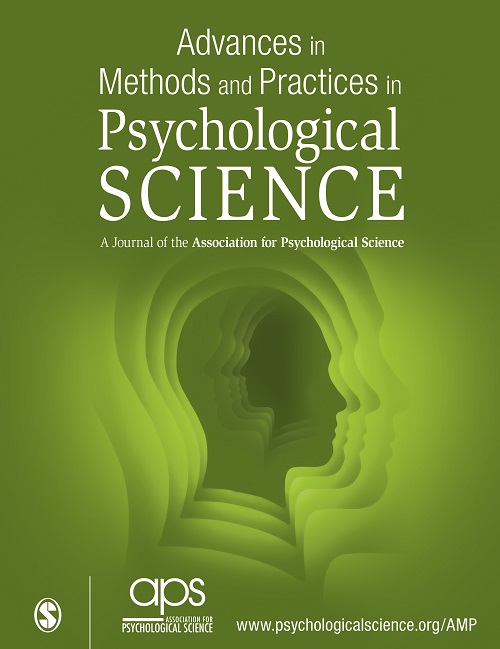Open-Science Guidance for Qualitative Research: An Empirically Validated Approach for De-Identifying Sensitive Narrative Data
IF 13.4
1区 心理学
Q1 PSYCHOLOGY
Advances in Methods and Practices in Psychological Science
Pub Date : 2023-10-01
DOI:10.1177/25152459231205832
引用次数: 0
Abstract
The open-science movement seeks to make research more transparent and accessible. To that end, researchers are increasingly expected to share de-identified data with other scholars for review, reanalysis, and reuse. In psychology, open-science practices have been explored primarily within the context of quantitative data, but demands to share qualitative data are becoming more prevalent. Narrative data are far more challenging to de-identify fully, and because qualitative methods are often used in studies with marginalized, minoritized, and/or traumatized populations, data sharing may pose substantial risks for participants if their information can be later reidentified. To date, there has been little guidance in the literature on how to de-identify qualitative data. To address this gap, we developed a methodological framework for remediating sensitive narrative data. This multiphase process is modeled on common qualitative-coding strategies. The first phase includes consultations with diverse stakeholders and sources to understand reidentifiability risks and data-sharing concerns. The second phase outlines an iterative process for recognizing potentially identifiable information and constructing individualized remediation strategies through group review and consensus. The third phase includes multiple strategies for assessing the validity of the de-identification analyses (i.e., whether the remediated transcripts adequately protect participants’ privacy). We applied this framework to a set of 32 qualitative interviews with sexual-assault survivors. We provide case examples of how blurring and redaction techniques can be used to protect names, dates, locations, trauma histories, help-seeking experiences, and other information about dyadic interactions.定性研究的开放科学指南:去识别敏感叙事数据的经验验证方法
开放科学运动旨在提高研究的透明度和可访问性。为此,越来越多的研究人员被要求与其他学者共享去标识化数据,以供审查、重新分析和重复使用。在心理学领域,开放科学实践主要是在定量数据的背景下进行探索的,但共享定性数据的要求正变得越来越普遍。叙事数据要完全去标识化要困难得多,而且由于定性方法经常被用于边缘化、未成年和/或受创伤人群的研究中,如果参与者的信息日后被重新标识,数据共享可能会给参与者带来巨大风险。迄今为止,文献中几乎没有关于如何去识别定性数据的指导。为了弥补这一不足,我们开发了一个方法框架,用于补救敏感的叙事数据。这个多阶段过程以常见的定性编码策略为模型。第一阶段包括与不同的利益相关者和信息来源进行磋商,以了解可再识别性风险和数据共享问题。第二阶段概述了一个迭代过程,用于识别潜在的可识别信息,并通过小组审查和共识构建个性化的补救策略。第三阶段包括评估去标识化分析有效性的多种策略(即补救后的记录誊本是否充分保护了参与者的隐私)。我们将这一框架应用于一组 32 个性侵害幸存者的定性访谈。我们提供了一些案例,说明如何使用模糊和编辑技术来保护姓名、日期、地点、创伤史、求助经历以及其他有关二元互动的信息。
本文章由计算机程序翻译,如有差异,请以英文原文为准。
求助全文
约1分钟内获得全文
求助全文
来源期刊
CiteScore
21.20
自引率
0.70%
发文量
16
期刊介绍:
In 2021, Advances in Methods and Practices in Psychological Science will undergo a transition to become an open access journal. This journal focuses on publishing innovative developments in research methods, practices, and conduct within the field of psychological science. It embraces a wide range of areas and topics and encourages the integration of methodological and analytical questions.
The aim of AMPPS is to bring the latest methodological advances to researchers from various disciplines, even those who are not methodological experts. Therefore, the journal seeks submissions that are accessible to readers with different research interests and that represent the diverse research trends within the field of psychological science.
The types of content that AMPPS welcomes include articles that communicate advancements in methods, practices, and metascience, as well as empirical scientific best practices. Additionally, tutorials, commentaries, and simulation studies on new techniques and research tools are encouraged. The journal also aims to publish papers that bring advances from specialized subfields to a broader audience. Lastly, AMPPS accepts Registered Replication Reports, which focus on replicating important findings from previously published studies.
Overall, the transition of Advances in Methods and Practices in Psychological Science to an open access journal aims to increase accessibility and promote the dissemination of new developments in research methods and practices within the field of psychological science.

 求助内容:
求助内容: 应助结果提醒方式:
应助结果提醒方式:


